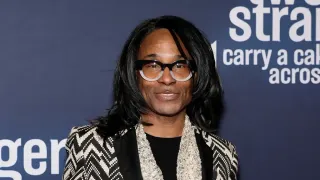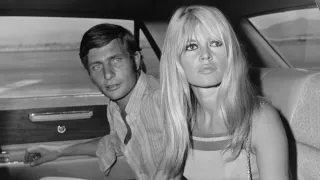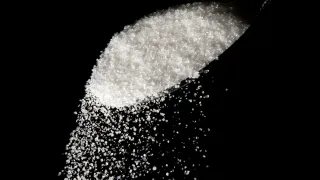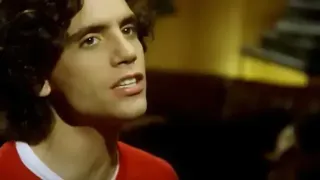June 4, 2023
Reflecting on the 2023 Cannes Film Festival
C.J. Prince READ TIME: 12 MIN.
Another edition of Cannes has come and gone, and at first glance the festival appears to have weathered the literal and figurative storms that came its way. The controversial decision to open the festivities with a film starring Johnny Depp turned into a distant memory almost two weeks later, possibly helped by the collective shrug critics made toward it. Events like the premiere of Martin Scorsese's "Killers of the Flower Moon" went exactly as intended in terms of generating buzz, and the media came away happy with an apparently strong lineup in the Official Competition.
The jury for the Official Competition, headed by last year's Palme d'Or winner Ruben Ostlund ("Triangle of Sadness"), gave the top prize to Justine Triet's "Anatomy of a Fall," a courtroom drama about a wife (Sandra Huller) accused of murdering her husband. The film was a critical favorite, alongside Jonathan Glazer's adaptation of the late Martin Amis' novel "The Zone of Interest." Glazer's film was one of the best reviewed titles at Cannes, but it took home the Grand Prix (basically second place) instead of the Palme. Both films should make their way to theaters later this year.
We took the opportunity of this year's festival to focus on some of the smaller titles that make up the sidebars and parallel festivals at Cannes, along with several Queer Palm nominees (the Queer Palm jury awarded Hirokazu Kore-eda's "Monster" this year). While all eyes tend to focus on the Competition, there are dozens of other films playing at the festival that can slip under the radar. Here are a few of them.
"A Prince"
Of the select films I saw from this year's Cannes line-up, none stayed with me like Pierre Creton's latest feature, which follows several characters who study and/or practice horticulture in Normandy. There's Pierre-Joseph (Antoine Pirotte), a college student who opts to study gardening (the only other option was to become a butcher); Françoise (Manon Schaap), the head of the college, and Alberto (Vincent Barre), Pierre-Joseph's teacher. Pierre-Joseph explores his own sexuality as he learns and works, sleeping with different men including Alberto and his married employer.
Creton and his co-writers opt to have different actors narrate from the perspectives of Pierre-Joseph, Françoise, and Alberto (voiced respectively by Grégory Gadebois, Françoise Lebrun, and Mathieu Amalric) as we observe them and other members of their community over the years. There's an intentional distancing effect between footage of characters engaging in mundane, day-to-day acts while the narration expresses these characters' longings and desires.
The juxtaposition works, and at its best "A Prince" conveys a fluidity between its characters, their feelings, and the rural environment surrounding them. Pierre-Joseph, Alberto, and the married employer frequently get together or pair off to have sex or work together, and Creton just observes them in this harmonic state, their urges for affection and lust unfolding as naturally as the trees and plants around them grow.
The final section, where an older Pierre-Joseph (played by Creton, who swaps places with the younger actor mid-scene) crosses paths with Françoise's adopted son, sees Creton stumble with the usage of special effects to underline one of the film's central metaphors. But the further I get from "A Prince," the other moments stick with me the most. Creton's ability to render such a vivid picture of a specific time and place, showcasing characters of a class and background who rarely get this amount of time and space dedicated to them, is the sort of rare achievement that should be celebrated whenever it comes along.
"The Goldman Case"
Cédric Kahn's film opened this year's Directors' Fortnight, and it's easy to see why. A fact-based re-enactment of a trial held in mid-1970s Paris, "The Goldman Case" is a full-blown courtroom drama; the kind of accessible French drama that can kick off a film festival in its own country. The defendant is Pierre Goldman (Arieh Worthalter), a left wing activist on trial for multiple robberies, including one that left two women dead. He denies the murder charges, and the trial becomes a major event due to Goldman's infamy after writing a successful autobiographical book while in prison (this is actually Goldman's second trial, as he was sentenced to life imprisonment in 1974 but an appeals court canceled the initial ruling).
Kahn goes for a verite style, with multiple handheld cameras set around the courtroom, no score, and a 4x3 aspect ratio to resemble a documentary from the time period. This method isn't exactly reinventing the wheel, but Kahn's focus on naturalism and self-containment (aside from an opening sequence at Goldman's lawyer's office and some moments in his holding cell, everything stays in the courtroom) makes "The Goldman Case'' compelling enough on a moment by moment basis.
This approach also lets Kahn hone in on the aspects of this true story that he prefers to explore, like the greater political and social questions the trial poses. Goldman's own Jewish background, as well as his involvement with black activists (some of whom attend the trial in support of him), take an important role in the trial as racism and anti-Semitism from the police show a corrupt investigation. Naturally, the outspoken, political nature of Goldman himself makes for a rowdy time with the trial, as his outbursts, retorts, and principles lead to many an outburst from everyone. I can't say that Kahn's film did much for me in terms of painting a portrait of the heated, divisive times in 1970s France (perhaps due to the limited setting, or just something that might translate more to a French audience), but "The Goldman Case" does a fine enough job within its own parameters.
"Power Alley"
Lillah Hallah's debut feature walked away with a prize from the International Federation of Film Critics (FIPRESCI for short), which isn't too surprising given the crowd-pleasing nature of this story involving a rebellious group of teens. 17-year-old Sofia (Ayomi Domenica Dias) is the star player on her volleyball team, ready to win the championship game and get scholarships to attend a university in the US. Then she finds out she's pregnant, and abortions are illegal in Brazil under the rule of Jair Bolsonaro. Her attempts to get the procedure done by traveling to Uruguay fails due to bureaucratic red tape, so her teammates rally around her to find a solution in time for the big game.
The plot of "Power Alley" is more conventional than it looks, and part of the fun comes from how Hallah's unconventional characters operate within this framework. The team is largely made up of queer women, all of whom have no qualms when it comes to doing whatever they want; early on, one of the girls tries to convince her teammates to use their period blood as a face mask while chatting in the locker room. The brash nature of Sofia and her friends, the fluidity of their identities and relationships, and their overall loyalty and love for each other are the best parts of "Power Alley." It's just too bad that the film's own story and structure don't reflect the same middle-finger attitude, with a group of religious fundamentalist villains and a predictable climax at the big game coming across as a bit too contrived. But there's enough vibrant energy here to make Hallah a new filmmaker to keep an eye on.
"A Song Sung Blue"
It doesn't take long before "Call Me By Your Name" comes to mind during "A Song Sung Blue," given the surface level similarities between both stories. Teenager Xian (Meijun Zhou) gets her life disrupted over summer break when her mother accepts an offer to work overseas for a year. Xian gets sent off to stay with her estranged father. Xian meets Mingmei (Ziqi Huang), the 18-year-old daughter of her father's girlfriend, and she immediately becomes taken with her confidence and free-spirited nature.
The formative summer during one's adolescence and the inevitably tragic romance are there, however first-time feature filmmaker Zihan Geng keeps the romantic elements buried. Xian's shyness and confusion aren't necessarily a queer awakening, and Geng leaves enough room for interpretation to make "A Song Sung Blue" function as a story of someone trying to figure out who they are in their search for a meaningful, human connection. That ambivalence ends up being the film's greatest weakness, since Xian's lack of identity makes her too much of a blank slate to have any emotional connection with. And as much as Geng's intent can be seen, like the soft, hazy imagery evoking a sense of nostalgia as well as representing Xian's developing perspective on the world, the execution can range from dull to hokey. By the time Xian's summer comes to an end, with the realization that her experience will always remain in the past, "A Song Sung Blue" doesn't do much more than serve as a reminder of other works that successfully covered the same ground.
"Only the River Flows"
Already on his third feature since 2020, Chinese filmmaker Shujun Wei takes a left turn from his 2021 film "Ripples of Life" to tackle a murder mystery in "Only the River Flows." Set in rural China during the 1990s, detective Zhe Ma (Yilong Zhu) gets tasked with solving the murder of an older woman. Everyone points to a homeless man as the likely culprit (it doesn't help that his nickname is "Madman"), although no one ever saw him being violent before. But a discovery of a purse near the crime scene, a cassette inside the purse containing secret messages from a woman to her lover, and a witness' claims of a woman with wavy hair at the crime scene complicate matters. As Zhe Ma dives deeper into the case, his grasp on a suspect only gets looser, and with mounting pressure from his authorities to make an arrest and move on, his grasp on reality begins to suffer as well.
Wei has plenty of style to spare here, thanks to him and cinematographer Chengma using 16mm film, leaning hard into the format's perceived imperfections to let the film's blurred, wet, and grimy visuals establish a strong mood. It goes a long way to make up for the story, which gets too bogged down by red herrings and digressions around the case to the point of frustration. Wei's attempts to transition to Ma's subjective, faulty point of view in the final act fumbles as well, with obvious signposts of his inability to discern fantasy and reality that goes against the more effective, atmospheric elements in the film's first half. If you can get on Wei's wavelength in terms of visuals, "Only the River Flows" offers plenty to admire. Just don't let the pesky plotting get too much in the way.
"Chicken for Linda!"
Finally, a pleasant surprise tucked in the ACID lineup, a parallel section at Cannes that specializes in independent films seeking French distribution. "Chicken for Linda!" is an animated feature about eight-year-old Linda and her widowed mother Paulette, who still grieves the loss of her husband when Linda was a baby. A mishap makes Paulette believe that Linda lost her wedding ring, prompting her to lash out on Linda and hit her over losing such a precious item. Once Paulette recovers the ring and realizes her mistake, she tells Linda she'll do anything to make up for her error. Linda's one demand: make chicken with peppers, the same dish her father used to cook.
That's when things snowball into chaos, as the entire world seems hellbent on preventing Paulette and Linda from achieving their goal: a general strike means all the shops are closed, which brings Paulette to an egg farm, which results in her stealing a live chicken, which then involves the police, a truck driver, Paulette's sister, and eventually the entire neighborhood. Directors Chiara Malta and Sébastien Laudenbach keep everything light and funny across the short runtime, while their hand drawn animation style, where each character gets shaded in a different color that tends to veer outside the lines, has a distinctive quality that makes every frame engaging on some level.
Even when the film threatens to veer into sentimental territory around the death of Linda's father, Malta and Laudenbach are wise enough to never focus on it too much. There's just enough in there to get across how the experience brings Linda and Paulette closer together, while giving Linda insight into a father she barely knew, without upending the comedic tone. Given Cannes' prevalence as an art film festival, there's always an expectation of engaging with more challenging or radical works across its lineup. "Chicken for Linda!" provides an ideal alternative, a film that's light on its feet, doesn't wear out its welcome, and knows it.






